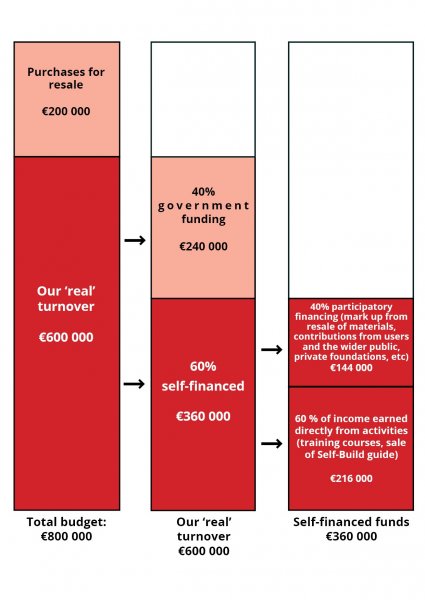Atelier Paysan - in contrast to most organisations working in agricultural development - is not mainly funded by the State. "The collective strives for 60% self-financing through both trading and participatory financing." (website)
FAQ: What are your economic growth predictions?
Atelier Paysan: In terms of employment and investment, we don’t currently know. We do not have any grand plans but we aim to find the means to respond to the needs that emerge from this collective adventure.
Atelier Paysan gets along combining: material and self-build guide resale +++ course fees ++ voluntary contributions to solidarity fund ++ crowdfunding ++ partnership with Citoyens Solidaires (for tax reduction) ++ building capital equity through shares and partnership accounts ++ networking ++ public recognition and funding. (details below)

Economic Model.
source ![]()
Participants of training courses pay a fee towards Atelier Paysan’s R&D programme and the depreciation of the cooperative’s equipment.
There are Open work days, Introductory courses to make smaller self-built tools, 2 day courses on Computer-Aided Design, for complex tool design with 3D CAD ensuring the kinematic of the structure and quickly calculate its weight. There are Participatory work days on farms for prototyping tools or to convert all of the farm’s agricultural machinery to a quick hitch triangle html ![]() . And finally, there are courses about "Architecture for small scale farming” courses,
. And finally, there are courses about "Architecture for small scale farming” courses,

The Quick Hitch Triangle
source ![]()
Participants also contribute to a solidarity fund for those unable to pay the full amount for their training courses. How the funds are being used is retractable for all users, to create Transparency in a Sphere of Trust.
It is important to note, that Atelier Paysan is not recognised as a public-interest organisation (in German equivalent to "Gemeinnützigkeit" and thus not eligible for income tax relief. A partnership with Citoyens Solidaires is the answer.
Citoyens Solidaires are eligible and return 80% of the contributions made for Atelier Paysan. 66% of an individual’s contribution can be deducted from their tax return (on up to 20% of their taxable income). The contributions made by businesses benefit from a 60% reduction of corporate tax (on up to 0.5% of their turnover). It is a "creative" way to Finance Commons Public Circuits.
Crowd Funding or other forms of participatory fund-raising help finance new ventures. In Spring 2015, the first crowd-funding campaign “Blue Bees” html ![]() . raised €21 000 to purchase of a third workshop truck and the equipment needed for the workshop (welding stations, drills, plasma cutting machine, grinders).
. raised €21 000 to purchase of a third workshop truck and the equipment needed for the workshop (welding stations, drills, plasma cutting machine, grinders).
As a cooperative, Atelier Paysan is able to build capital equity html ![]() , not-for-profit organisations usually are not), they can request loans (DID THEY EVER DO?) or call on its members to purchase shares and open partnership accounts.
, not-for-profit organisations usually are not), they can request loans (DID THEY EVER DO?) or call on its members to purchase shares and open partnership accounts.
all our surplus is allocated to the indivisible reserves of the cooperative. (FAQ)
Atelier Paysan is also part of the CIGALES network (Investment Clubs for an Alternative and Local Management of Solidarity Savings, html ![]() , which brings together citizens who wish to place their savings into local projects. In September 2015, €56 000 of shares came in that way.
, which brings together citizens who wish to place their savings into local projects. In September 2015, €56 000 of shares came in that way.
We believe our work developing and disseminating common goods needs to be supported by public funding
- 2013: first public support by the Rhone Alpes region, €60,000 over 2 years + integration into regional development plan for organic agriculture with €37,000 between 2014 and 2017
- 2013/4: Brittany and the Water Agency for Brittany and the Loire, supported the establishment of a branch of Atelier Paysan in the north west of France with €39,500
- September 2014: self-built principles and adapted machinery were recognised in the law for the future of agriculture adopted by the French National Assembly.
- 2015: Atelier Paysan became an ONVAR html ![]() in France an organisational status assigned by the Ministry of Agriculture which includes a financial supporte (€80,000 a year for 6 years).
in France an organisational status assigned by the Ministry of Agriculture which includes a financial supporte (€80,000 a year for 6 years).
# See also Atelier Paysan, Atelier Paysan Provisioning